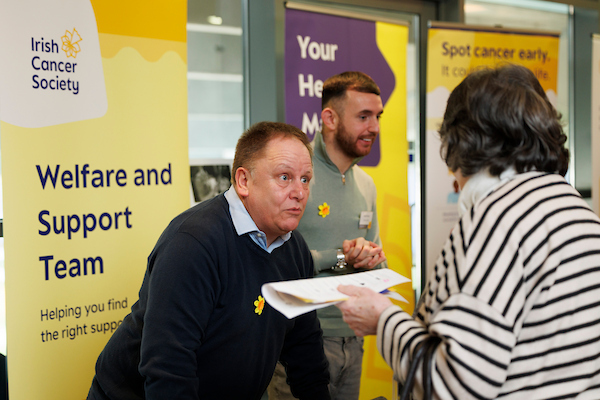Follow-up care after cancer treatment
After your cancer treatment has ended, you will still need regular check-ups. This is called follow-up.
How often will I have follow-up appointments?
Usually you’ll see your consultant every 3-6 months for the first year. But it will depend on your diagnosis and the type of treatment you are having.
Once you have completed your treatment you may be offered follow-up appointments at 6-monthly intervals and then yearly thereafter.
Your nurse specialist, oncology liaison nurse or consultant will give you details about your specific follow-up plan.
Why are follow-up appointments important?
You may have mixed feelings about your follow-up appointments. You may feel like you just want to forget about cancer. You may also feel anxious beforehand, but it’s important that you go to all your appointments.
Follow-up gives your doctor the chance to:
- Ask you about your recovery and any side-effects or symptoms your have
- Help with any side-effects or symptoms that you may have. This may include referring you to other services, such as a dietitian or a physiotherapist
- Check for signs of new side-effects that may develop after you have finished treatment
- Check for signs of recurrence (the cancer coming back)
Even though you may feel nervous, it's better to be aware of any changes in your disease as soon as possible so that suitable treatment can be given.
Your appointment is also an opportunity for you to ask any questions and discuss any concerns you may have.
If you can’t go to an appointment, call the hospital and reschedule.
It may be possible for your hospital to arrange follow-up for you abroad if you move away from Ireland. Speak to your doctor or specialist nurse about this.
Getting the best from your follow-up
Tell your doctor or nurse how you have been since your last appointment. Tell them about:
- Any new symptoms, aches or pains you have
- If you’re finding it hard to cope
Talk to your doctor about any concerns you have even if they do not ask you directly.
Your follow-up appointment is also a chance to ask about any other help you might need. For example, if you’d like to be referred for counselling or other emotional support or if you’d like to talk to a dietitian or physiotherapist.
You could also ask your consultant about:
- Any symptoms to expect or watch out for
- How to manage any side-effects or symptoms that are causing you upset or discomfort
- What to do or who to contact if you have any symptoms or concerns. For some symptoms the hospital may prefer you to contact them. Other times your GP might be the best person
- Any prescribed or non-prescribed medicines you're taking. Tell them also if you're taking vitamins, minerals or herbal supplements.
Sometimes it helps to make a list of questions to bring with you into the consultation so that you don’t forget once you get in there.
You may like to bring someone you trust with you so that they can listen and ask any questions that you may have forgotten to ask and help you to remember the answers.
Ask for a contact number in case you have any worries or questions between appointments.
What if I have problems before my appointment?
If you are between check-ups and have a symptom or problem that’s worrying you, call your specialist nurse for advice or to arrange an earlier outpatient appointment if necessary.
If you become suddenly unwell and can’t contact your specialist nurse or hospital team, go to your GP or the emergency department at the hospital.
What if the cancer comes back?
It’s very normal to worry about cancer coming back. It can be very distressing to live with this fear, although most people adjust in time. Read more about your feelings after cancer treatment.
You may worry that side-effects of your treatment are a sign that your cancer has come back. This can be very distressing. Speak to your doctor if you are worried, but remember that side-effects like fatigue and pain after cancer treatment are very common and usually get better after a while.
If cancer does come back (recurrence), it can often be treated again. Your cancer doctor will advise you on what your treatment options are. Read more about recurrence.
Remember: If you are worried or notice any new symptoms between appointments, let your doctor know, especially if you have:
- A pain that does not go away, usually in one place
- New or unusual lumps or swelling
- Nausea, vomiting, diarrhoea or loss of appetite
- Unexplained weight loss
- A fever or cough that does not go away
- Unusual rashes, bruises or bleeding
- Any other symptom you are concerned about
Be honest with your team. This helps them to give you the best support.
Related links



Talk to a Cancer Nurse

Support Line
Our Daffodil Centres

